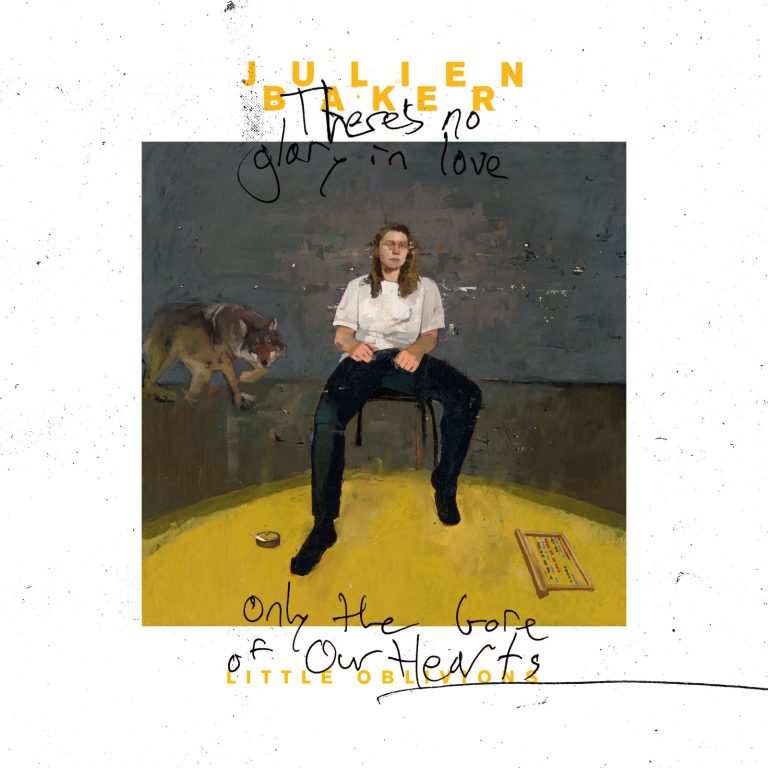
Julien Baker’s debut album ‘Sprained Ankle’, captured in a stark, monochromatic image by Jake Cunningham, presented an austere look into her music’s soul. Unlike the initially self-designed and obscure Bandcamp cover, the published photorealistic expression of minimalist sobriety only scratched the surface of Baker’s heartrending lyrics. (Locating the original artwork is an internet treasure hunt, mostly buried in Tumblr’s forgotten realms.) A reviewer once compared the subtle expression on her album cover to a “Mona Lisa smile cast in a spectrum of cool blues,” indicating its enigmatically poised melancholy. Ian Cohen for Pitchfork noted that the near-smiling visage led him to question if the album was meant for the public eye at all, a testament to its intimate aura.
Julien Baker’s most recent album, ‘Little Oblivions’, places the focus intensely on her, literally centering her obscured portrait in the midst of existential lyrics. Wylee Risso’s oil painting encapsulates a fading identity, akin to a person sinking into their subconscious, anchored by the album’s lines “There’s no glory in love/ Only the gore of our hearts” from the track ‘Bloodshot’. I had the opportunity to speak with Risso about his process in crafting the cover art for this Behind the Artwork series interview.
During our conversation about the creation of Julien Baker’s ‘Little Oblivions’ artwork, Wylee Risso shared his artistic journey, beginning with illustrations and comic books in childhood and eventually self-exploring oil painting. Now, five years into perfecting his craft, his passion and curiosity in the art form continue to grow, affirming his belief in lifelong learning and artistic evolution.
This album cover marks Risso’s inaugural venture into music-related visual art. He recounts his past connections with punk culture and his gradual gravitation towards a sincere appreciation of artwork. His encounter with Baker’s music on 6131 Records deeply resonated with him, merging his love for punk’s ethos and Baker’s emotive soundscapes into an interconnected admiration.
Sean Patrick Rhorer, Baker’s manager, initiated the collaboration with Risso, recalling their past encounter while touring. Rhorer’s love for Risso’s work, coupled with their shared punk and hardcore music scene background, reflected an authentic connection that ultimately led to Risso’s selection for the project.
Risso disclosed the iterative and conversational process involved in finalizing the artistic direction for ‘Little Oblivions’. Only after months of digital sketching, and exchanges about Baker’s life experiences and her emotional journey through group therapy and recovery, did Risso solidify the album’s visual essence. Through these discussions, he harnessed the abstract imagery of communal healing, encapsulated by an almost tangible heaviness surrounding the portrayal.
When examining the album cover, Baker’s enigmatic expression stands out, an intentional choice that resonates with Risso’s own artwork and personal experiences. By obscuring certain facial features, Risso reflects the tumultuous aspects of mental health, translating internal chaos into visual representation.
Exploring the specific details within the artwork, such as the subtle presence of a wolf, the inclusion of an abacus, and the seemingly routine ashtray, Risso expresses the deeper, potentially healing symbolism within these objects. Without precise knowledge of all the album’s tracks during his creative process, Risso skillfully integrated elements that mirrored the album’s themes of lurking struggles and coping mechanisms.
Risso’s depiction of Baker’s posture lends itself to a disorienting, surreal effect, connecting back to initial photograph requests and eventually translating into an abstract eerie realism. In hindsight, the experience of creating the album’s artwork left Risso feeling intimately linked with Baker, despite their minimal interaction, bridging an emotional and artistic connection that must be experienced rather than simply observed.
Conversations have been streamlined for more concise reading.
Explore more of Wylee Risso’s artwork here.